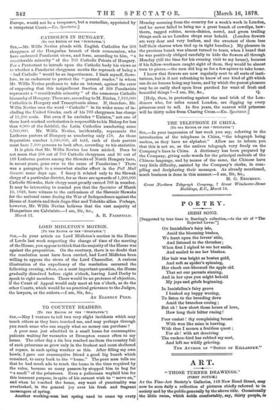TO COUNTRY READERS.
(TO THE EDITOR OF THE SPECTATOR.") Sin,—May I venture to tell two very slight incidents which may touch others as they have touched me, and may perhaps through you reach some who can supply what no money can purchase ?
A poor man just admitted to a small home for consumptive patients waiting for vacancies at Brompton comes often to my house. The other day a tin box reached me from the country full of such primroses as grow only in the freshest and most sheltered of copses, in such spring weather as this. After filling my own bowls, I gave our consumptive friend a good big bunch which remained, to carry back to the "home." The poor man tells me that he had much ado to reach the home in the time required by the rules, because so many passers-by stopped him to beg for "a smell" of the primroses. Even a policeman waylaid him for this innocent purpose, in spite of his earnest wish to "move on," and when he reached the home, any want of punctuality was overlooked, in the general joy over his fresh and fragrant messengers of spring.
Another working-man last spring used to come 'up every Monday morning from the country for a week's work in London, and he never failed to bring me a great bunch of cowslips, haw- thorn, ragged robins, moon-daisies, sorrel, and green trailing things such as no London shops ever beheld. (London flowers are very dear and very leafless, and the sweetest of them lose half their charms when tied up in tight bundles.) My pleasure in the precious bunch was almost turned to tears, when I heard that he was positively obliged carefully to hide the flowers all through Monday (till the time for his evening visit to my house), because- if his fellow-workmen caught sight of them, they would be almost torn to pieces,—the men did beg so for a few apiece to take home.
I know that flowers are now regularly sent to all sorts of insti- tutions, but is it not refreshing to know of one kind of gift which can do no human being any harm, and by which the purest pleasure may be so easily shed upon lives parched for want of fresh and beautiful things ?—I am, Sir, &c., Q.
[Help, then, in protesting against the mad trick of the Lon- doners who, for miles round London, are digging up efery primrose-root to sell. In five years, the nearest wild primrose will be thirty miles from Charing Cross.—En. Spectator.]


































 Previous page
Previous page